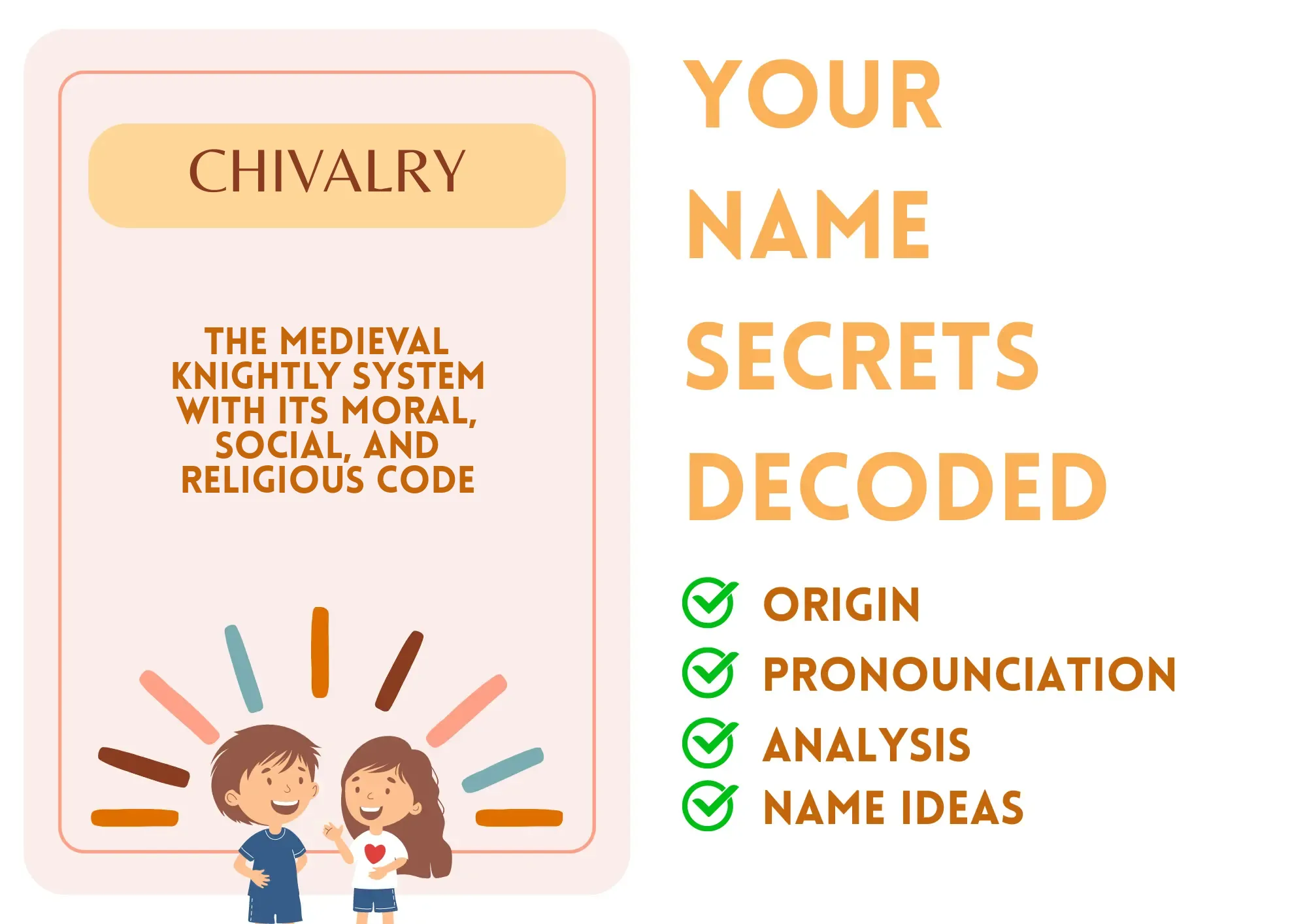
Chivalry
Chivalry is a name derived from the term used to denote the medieval knightly system, embodying ideals of honor, bravery, and protection. While not a traditional given name for individuals, it represents a concept that is heavily intertwined with historical codes of conduct, particularly in relation to knights and noblemen. It evokes qualities such as honor, bravery, and a sense of duty, particularly towards women and the vulnerable.
Chivalry is perceived positively, representing an idealized sense of nobility and moral uprightness. It is easy to pronounce, though its uncommon usage as a name might lead to confusion or surprise among those who hear it for the first time.
In literary and popular culture, chivalry is often romanticized, linking it to tales of knights and noble deeds, making it a charming choice for those looking for a unique name that conjures images of heroism and nobility.
Basic Information
Gender: Unisex
Sounds Like: SHIH-vuhl-ree
Pronunciation Explanation: The emphasis is on the first syllable 'SHIH', followed by a softer 'vuhl', and ending with 'ree'.
Summary and Meaning
Meaning: the medieval knightly system with its moral, social, and religious code
Origin: Chivalry has its origins in the French word 'chevalerie', which relates to horse riding ('cheval' meaning horse) and the conduct of knights in the Middle Ages.
Usage: Although traditionally associated with male knights, the concept of chivalry encompasses values that can be embraced by any gender.
Name Number (Chaldean)
Name Number (Pythagorean)
Popularity (Global Rank)
Overall: 523026
Boys:
Girls: 77177
Most Popular in
Religious and Cultural Significance
Religion: Christian
Background: Chivalry is often associated with the Christian valor of knights, where notions of honor were aligned with the teachings of the church, emphasizing duty and protection of the innocent.
Cultural Significance: Within Western culture, chivalry has played a significant role in defining gender roles and moral behavior, especially during the medieval period.
Historical Significance: Chivalry shaped much of European history, influencing the social structures, ethics of warfare, and the relationship between nobles and commoners during the Middle Ages.
Popular Culture
Literature and Mythology: Chivalry is prominently featured in Arthurian legends, where knights like Sir Lancelot exemplify its principles.
Movies and Television: Chivalry appears in numerous films and shows, particularly those set in medieval times, often characterizing heroes who embody knightly virtues.
Feelings and Perceptions
Perception: Chivalry is commonly perceived as a noble concept, evoking respect and admiration for its connotations of honor and bravery. However, it may also be seen as somewhat outdated in a modern context.
Positive Feelings: Noble, heroic, honorable, romantic, idealistic.
Negative Feelings: May come across as overly archaic or unattainable in today's society.
Practical Considerations
Ease of Writing and Calling: The name Chivalry is relatively easy to write and pronounce but may be misinterpreted or mistaken for themes rather than a name.
Common Typos and Misspellings: Chivalrye,Chvalry,Chivarly,Chivalery
Common Nicknames: Chiv,Chivy
Chivalry Popularity
Chivalry Usage and Popularity By Country
| Country | Rank (Overall) |
|---|---|
| Thailand | 60600 |
| South Africa | 120008 |
| Canada | 149654 |
| Indonesia | 169744 |
| United States | 216664 |
Chivalry Usage and Popularity By City
| City | Rank (Overall) |
|---|
Compatibility Analysis
Famous Persons Named Chivalry
No results found for Chivalry.
Related Names
Similar Sounding Names:
Shivery,Sylvie,Chalet